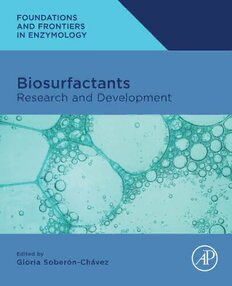Table Of ContentBiosurfactants
FOUNDATIONS AND FRONTIERS IN ENZYMOLOGY SERIES
SeriesEditor:Munishwar Nath Gupta
Series Website:
https://www.elsevier.com/books-and-journals/book-series/books-series-
landing-page-request-foundations-and-frontiers-in-enzymology
Foundations and Frontiers in Enzymology
Biosurfactants
Research and Development
Edited by
Gloria Sobero´n-Cha´vez
Departamento de Biologı´a Molecular y Biotecnolog´ıa,
(cid:1)
Instituto de Investigaciones Biomedicas, Universidad Nacional
Auto´noma de M(cid:1)exico, Ciudad Universitaria, CDMX, Mexico
Contributors
Rodrigo Arreola-Barroso
DepartmentofCellEngineeringandBiocatalysis,InstituteofBiotechnology,NationalAutonomous
University ofMexico, Cuernavaca,Morelos,Mexico
Niki Baccile
Sorbonne Universit(cid:1)e, Laboratoirede Chimiede laMatie`re Condens(cid:1)ee de Paris (LCMCP), UMR
CNRS 7574, Paris, France
IsabelBator
iAMB-InstituteofAppliedMicrobiology,ABBt-AachenBiologyandBiotechnology,RWTHAachen
University, Aachen,Germany
Lars Mathias Blank
iAMB-InstituteofAppliedMicrobiology,ABBt-AachenBiologyandBiotechnology,RWTHAachen
University, Aachen,Germany
StijnBovijn
Centre for Industrial Biotechnology and Biocatalysis (InBio.be), Department ofBiotechnology,
Facultyof Bioscience EngineeringGhent University, Coupure Links, Ghent,Belgium
ChettJ. Boxley
GlycoSurf, Inc., SaltLakeCity, UT, United States
Martijn Castelein
Centre for Industrial Biotechnology and Biocatalysis (InBio.be), Department ofBiotechnology,
Facultyof Bioscience EngineeringGhent University, Coupure Links, Ghent,Belgium
(cid:1)
B. Cid-Perez
ChemicalEngineeringDepartment,CINTECX;AnalyticalandFoodChemistryDepartment,Faculty
of Chemistry,University ofVigo, Vigo, Spain
J.M. Cruz
Chemical Engineering Department, CINTECX, University ofVigo, Vigo, Spain
Paulade Camargo Bertuso
Interunits GraduateProgramin Bioengineering, University ofSa˜o Paulo, Sa˜o Carlos, SP,Brazil
Nicolasde Fooz
Centre for Industrial Biotechnology and Biocatalysis (InBio.be), Department ofBiotechnology,
Facultyof Bioscience EngineeringGhent University, Coupure Links, Ghent;Laboratory of
IntegrativeMetabolomics(LIMET),DepartmentofTranslationalPhysiology,InfectiologyandPublic
Health,Facultyof VeterinaryMedicine Ghent University, Salisburylaan, Merelbeke,Belgium
(cid:1)
EricDeziel
Centre Armand-Frappier Sant(cid:1)eBiotechnologie, Institut Nationalde la Recherche Scientifique
(INRS), Universit(cid:1)e du Qu(cid:1)ebec, Laval,QC, Canada
Sven Dierickx
Centre for Industrial Biotechnology and Biocatalysis (InBio.be), Department ofBiotechnology,
Facultyof Bioscience EngineeringGhent University, Coupure Links, Ghent;Laboratory of
xiii
xiv Contributors
IntegrativeMetabolomics(LIMET),DepartmentofTranslationalPhysiology,InfectiologyandPublic
Health,FacultyofVeterinary Medicine Ghent University, Salisburylaan, Merelbeke, Belgium
Holger Dittmann
Department ofBioprocess Engineering, University ofHohenheim, Institute ofFood Science and
Biotechnology, Stuttgart, Germany
MelanieFilbig
iAMB-InstituteofAppliedMicrobiology,ABBt-AachenBiologyandBiotechnology,RWTHAachen
University, Aachen,Germany
€
Sigrid Gorgen
MicrobialProcesses andInteractionsLab (MiPI),TERRA Teachingand ResearchCentre,Cross
border JointResearchUnit(UMRt)BioEcoAgro, GemblouxAgro-Bio Tech/University ofLie`ge,
Gembloux, Belgium
Tony Gutierrez
Institute ofMechanical,Process and Energy Engineering, School ofEngineeringand Physical
Sciences, Heriot-Watt University, Edinburgh,UnitedKingdom
Rudolf Hausmann
Department ofBioprocess Engineering, University ofHohenheim, Institute ofFood Science and
Biotechnology, Stuttgart, Germany
Marius Henkel
Department ofBioprocess Engineering, University ofHohenheim, Institute ofFood Science and
Biotechnology, Stuttgart, Germany
David E. Hogan
Department ofEnvironmentalScience,University of Arizona, Tucson, AZ, United States
Alexis C.R. Hoste
MicrobialProcesses andInteractionsLab (MiPI),TERRA Teachingand ResearchCentre,Cross
border JointResearchUnit(UMRt)BioEcoAgro, GemblouxAgro-Bio Tech/University ofLie`ge,
Gembloux, Belgium
Philippe Jacques
MicrobialProcesses andInteractionsLab (MiPI),TERRA Teachingand ResearchCentre,Cross
border JointResearchUnit(UMRt)BioEcoAgro, GemblouxAgro-Bio Tech/University ofLie`ge,
Gembloux, Belgium
Sonja Kubicki
Institute ofMolecularEnzyme Technology, Heinrich-Heine-Universit€atDu€sseldorf,Ju€lich,
Germany
AlexeyLlopiz
DepartmentofCellEngineeringandBiocatalysis,InstituteofBiotechnology,NationalAutonomous
University of Mexico, Cuernavaca, Morelos,Mexico
A.Lo´pez-Prieto
Chemical EngineeringDepartment,CINTECX,University ofVigo, Vigo, Spain
Goedele Luyten
Centrefor Industrial Biotechnologyand Biocatalysis (InBio.be), Department ofBiotechnology,
FacultyofBioscience EngineeringGhent University, CoupureLinks,Ghent,Belgium
Contributors xv
Raina M. Maier
Department of Environmental Science,University ofArizona,Tucson, AZ,United States
A. Martı´nez-Arcos
Chemical Engineering Department, CINTECX, University ofVigo, Vigo, Spain
A.B. Moldes
Chemical Engineering Department, CINTECX, University ofVigo, Vigo, Spain
Christina Nikolova
InstituteofMechanical, Processand Energy Engineering, SchoolofEngineeringand Physical
Sciences, Heriot-Watt University, Edinburgh, United Kingdom
MarciaNitschke
Sa˜oCarlosInstituteofChemistry;InterunitsGraduatePrograminBioengineering,UniversityofSa˜o
Paulo,Sa˜oCarlos, SP, Brazil
Tathiane FerroniPassos
Sa˜o CarlosInstituteofChemistry, University of Sa˜o Paulo, Sa˜o Carlos, SP, Brazil
AlexandrePoirier
Sorbonne Universit(cid:1)e, Laboratoirede Chimiede laMatie`re Condens(cid:1)ee de Paris (LCMCP), UMR
CNRS 7574, Paris, France
SophieRoelants
Centre for Industrial Biotechnology and Biocatalysis (InBio.be), Department ofBiotechnology,
Facultyof Bioscience EngineeringGhent University, Coupure Links, Ghent,Belgium
GloriaSaab-Rincon
DepartmentofCellEngineeringandBiocatalysis,InstituteofBiotechnology,NationalAutonomous
University ofMexico, Cuernavaca,Morelos,Mexico
Luis Servı´n-Gonza´lez
Departamentode Biologı´a Molecular yBiotecnologı´a,Institutode Investigaciones Biom(cid:1)edicas,
Universidad Nacional Auto´nomade M(cid:1)exico, CiudadUniversitaria,CDMX, Mexico
GloriaSobero´n-Cha´vez
Departamentode Biologı´a Molecular yBiotecnologı´a,Institutode Investigaciones Biom(cid:1)edicas,
Universidad Nacional Auto´nomade M(cid:1)exico, CiudadUniversitaria,CDMX, Mexico
WimSoetaert
Centre for Industrial Biotechnology and Biocatalysis (InBio.be), Department ofBiotechnology,
Facultyof Bioscience EngineeringGhent University, Coupure Links, Ghent,Belgium
Mart´ınP. Soto-Aceves
Departamentode Biologı´a Molecular yBiotecnologı´a,Institutode Investigaciones Biom(cid:1)edicas,
UniversidadNacionalAuto´nomadeM(cid:1)exico,CiudadUniversitaria,CDMX,Mexico;Departmentof
Microbiology, University ofWashington, Seattle,WA, United States
Ryan M. Stolley
GlycoSurf, Inc., SaltLakeCity, UT, United States
Stephan Thies
InstituteofMolecular EnzymeTechnology, Heinrich-Heine-Universit€atDu€sseldorf, Ju€lich,
Germany
xvi Contributors
Till Tiso
iAMB-InstituteofAppliedMicrobiology,ABBt-AachenBiologyandBiotechnology,RWTHAachen
University, Aachen,Germany
Lisa Van Renterghem
Centrefor Industrial Biotechnologyand Biocatalysis (InBio.be), Department ofBiotechnology,
FacultyofBioscience EngineeringGhent University, CoupureLinks,Ghent,Belgium
Lynn Vanhaecke
Laboratory ofIntegrative Metabolomics (LIMET),Department ofTranslational Physiology,
Infectiology and Public Health,Facultyof VeterinaryMedicine Ghent University, Salisburylaan,
Merelbeke, Belgium
X.Vecino
Chemical EngineeringDepartment,CINTECX,University ofVigo, Vigo, Spain
AcademicPressisanimprintofElsevier
125LondonWall,LondonEC2Y5AS,UnitedKingdom
525BStreet,Suite1650,SanDiego,CA92101,UnitedStates
50HampshireStreet,5thFloor,Cambridge,MA02139,UnitedStates
TheBoulevard,LangfordLane,Kidlington,OxfordOX51GB,UnitedKingdom
Copyright©2023ElsevierInc.Allrightsreserved.
Nopartofthispublicationmaybereproducedortransmittedinanyformorbyanymeans,electronicor
mechanical,includingphotocopying,recording,oranyinformationstorageandretrievalsystem,without
permissioninwritingfromthepublisher.Detailsonhowtoseekpermission,furtherinformationaboutthe
Publisher’spermissionspoliciesandourarrangementswithorganizationssuchastheCopyrightClearance
CenterandtheCopyrightLicensingAgency,canbefoundatourwebsite:www.elsevier.com/permissions.
ThisbookandtheindividualcontributionscontainedinitareprotectedundercopyrightbythePublisher(other
thanasmaybenotedherein).
Notices
Knowledgeandbestpracticeinthisfieldareconstantlychanging.Asnewresearchandexperiencebroadenour
understanding,changesinresearchmethods,professionalpractices,ormedicaltreatmentmaybecome
necessary.
Practitionersandresearchersmustalwaysrelyontheirownexperienceandknowledgeinevaluatingandusing
anyinformation,methods,compounds,orexperimentsdescribedherein.Inusingsuchinformationormethods
theyshouldbemindfuloftheirownsafetyandthesafetyofothers,includingpartiesforwhomtheyhavea
professionalresponsibility.
Tothefullestextentofthelaw,neitherthePublishernortheauthors,contributors,oreditors,assumeanyliability
foranyinjuryand/ordamagetopersonsorpropertyasamatterofproductsliability,negligenceorotherwise,or
fromanyuseoroperationofanymethods,products,instructions,orideascontainedinthematerialherein.
ISBN:978-0-323-91697-4
ForinformationonallAcademicPresspublications
visitourwebsiteathttps://www.elsevier.com/books-and-journals
Publisher:StacyMasucci
AcquisitionsEditor:PeterB.Linsley
EditorialProjectManager:BarbaraMakinster
ProductionProjectManager:PunithavathyGovindaradjane
CoverDesigner:MarkRogers
TypesetbySTRAIVE,India
Preface
Biosurfactants: Research and Development presents different aspects of the fascinating molecules,
withdifferentchemicalstructuresbutwiththecommonabilitytoactassurfactants,producedbydif-
ferenttypesofmicroorganismslikebacteriaandfungi.Thisbookhighlightsseveraluniquecharacter-
isticsandapplicationsofbiosurfactantsthatrelynotonlyontheirtension-activepropertiesbutalsoon
theirbiologicalactivities,presentssomeofthechallengesoftheirindustrialapplication,anddiscusses
themainresearchareasinthisemergingfield.Thisbookwillbeofinterestnotonlytoexpertsinthe
field,whowillbeabletoreviewthemostrecentresearchresultsandthedevelopmentofnovelappli-
cationsofbiosurfactants,butalsotostudentsoryoungscientistsinterestedintheareasofmicrobiology
andbiotechnology,whocanlearnaboutthefascinatingpropertiesofbiosurfactantsaswellasthemi-
croorganismsthatproducethemandtheirgeneticmanipulationtoincreasetheirproductivity.Aunique
characteristic of this book is that it contains contributions from authors working on different ap-
proachesandbiologicalmodels;itincludesasectionthatpresentsnovelapproachesforthesynthesis
of biosurfactants that are based on synthetic approaches or biocatalysis. Thus, Biosurfactants:
Research and Development fulfills the need of having a book that describes the fascinating world
of biosurfactants, presents an updated review of the field, and combines different approaches from
themorefundamentalaspectsofthesemoleculestotheirdifferentpotential applications, which will
be interestingtoa wide audience.
Surfactants,astension-activecompounds,mayactasdetergents,wettingagents,emulsifiers,foam-
ingagents,anddispersants.Thesecharacteristicsmakethemamenableforawiderangeofindustrial
applicationsrangingfromoilrecovery,toagriculture,aspartofsoapsanddetergents,andinthecos-
meticsandfoodindustries,amongothers.Mostofthesurfactantscurrentlyinthemarketarechemically
synthetized and are produced at a very low cost, but generally they are toxic and recalcitrant com-
pounds. Biosurfactants that are produced by microorganisms like bacteria and yeasts represent an
eco-friendly alternative, butcurrentlythey occupy only a small share ofthe market,mainly because
ofchallengesintheirlarge-scalesynthesisandhighcostsoftheirproduction.Inadditiontobeingnon-
toxicandbiodegradable,biosurfactantshavetheadvantageoverchemicallysynthesizedsurfactantsof
beingproducedbymicroorganismsandthuspossessbiologicalactivitiessuchassignalingmolecules
andantibiotics.Thus,thesechemicallydiversecompoundshaveuniquepotentialapplicationsbasedon
their physicochemical properties as surfactants that are combined with different bioactivities. These
unique potential applications include their use in biomedical and food industries, cosmetics, and
agriculture, for example.
Asmentionedpreviously,theaimofthisbookistoincludenewinsightsandapproachesthatad-
dressdifferentaspectsofbiosurfactantresearchanddevelopment.Itisnotintendedtoreviewthelit-
eratureondifferenttypesofbiosurfactants,buttohighlightnovelstrategiesandpotentialapplications.
Wearecurrentlyinanexcitingperiodforthefieldofbiosurfactantresearch,sinceglycolipidssuchas
sophorolipidsproducedbyyeasts,rhamnolipidsproducedbyPseudomonas,andalkylglycosidesthat
are semisynthetic surfactants are all available in the market, and there are many challenges to make
theseand other surfactantsmore competitive and able tofulfil specific needs.
Some of the research approaches that have recently been developed to achieve this purpose are
reviewed in this book, which is divided into five sections and thirteen chapters. Section I,
xvii

